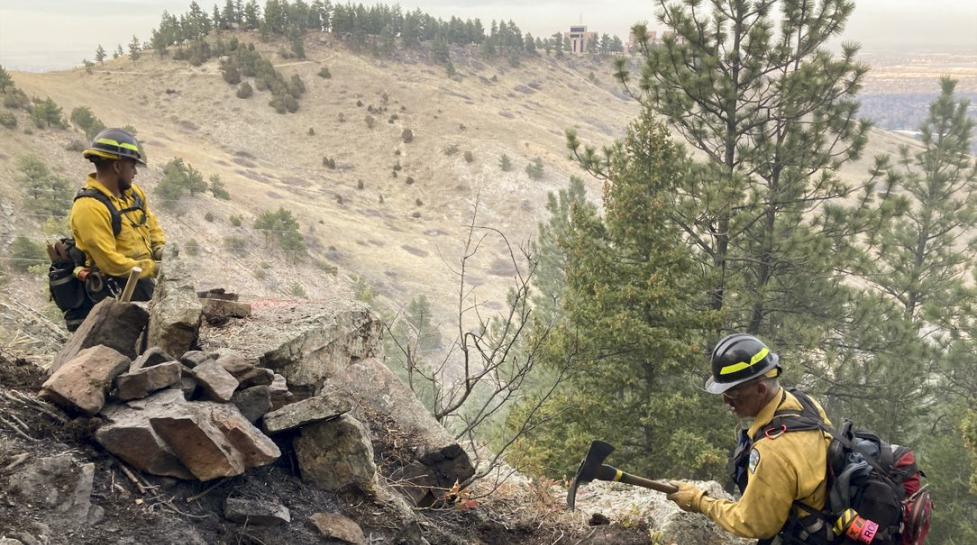Today, the United States Supreme Court delivered a critical victory to those suffering the harms of the climate crisis. The Court rejected ExxonMobil and Suncor’s petition for certiorari seeking to force three Colorado communities — who sued the companies for their role in the climate crisis and the local impacts the communities suffer — into federal court. The result of the Supreme Court’s denial is that the cases brought by Boulder County, San Miguel County, and the City of Boulder will proceed in Colorado state court.
In June 2022, after the U.S. Court of Appeals for the Tenth Circuit decided that the case belonged in state court, the companies sought Supreme Court review on two questions – whether federal common law actually governed the municipalities’ state law tort claims and whether federal courts thus have jurisdiction over the case. With the Supreme Court rejecting their petition, Exxon and Suncor can no longer forestall Colorado state courts’ consideration of the case. The cases will now proceed in the Colorado court system.
The Supreme Court also rejected petitions in four similar climate cases where the fossil fuel companies pressed the same arguments for federal jurisdiction. More than two dozen similar cases were filed in state courts across the country. Other high-profile climate litigation cases include those in Rhode Island, Baltimore, Hawai’i, and several California municipalities.
The City of Boulder issued the following statements:
“Today, the court affirmed what we know to be true – our case deserves its day in local court, where our communities experience the impacts and costs of climate change," said Boulder Mayor Aaron Brockett. "Oil companies are making record profits while our planet continues to warm. It’s only fair that the companies that profit from irresponsible actions compensate communities for the harm they cause.”
“There’s no doubt that climate change is very costly for local government. Taxpayer dollars are stretched to support key services, and the costs to prepare for and recover from climate disasters are too much for communities alone to bear," said Boulder City Manager Nuria Rivera-Vandermyde. "Today’s decision is a step toward justice. Colorado communities will have the chance to hold oil companies responsible for the hundreds in millions in damages their actions cause.”
EarthRights General Counsel Marco Simons issued the following statement:
“Since the Colorado communities filed this case in 2018, ExxonMobil and Suncor have consistently sought to delay the litigation—moving the case from court to court and losing each step along the way. Today’s development brings these communities one step closer to holding fossil fuel companies accountable for their misconduct and obtaining remedies for the serious climate harms Colorado residents face.
“Every court that has reviewed this case has come to the same conclusion–that it should be heard in a local court, by a local jury. The Supreme Court’s decision today confirms that. This case is not about changing national climate policy — it’s about accountability for the climate harms in Colorado that companies like Exxon and Suncor are responsible for.”
Boulder County Commissioner Ashley Stolzmann issued the following statement:
“Boulder County is thrilled by the U.S. Supreme Court’s decision not to take up this case. Our lawsuit against Exxon and Suncor should be determined in Colorado state court – where the actions of these companies are negatively impacting our residents. Communities like ours are exposed to destructive climate change impacts caused by the actions of fossil fuel companies while they reap record profits. These companies need to pay their fair share to deal with the climate chaos they’ve created and take responsibility for the climate impacts. Local governments cannot shoulder the price tag of climate change alone.”
San Miguel County Commissioner Hilary Cooper issued the following statement:
“This is excellent news for San Miguel County. It’s only fair that our lawsuit against Suncor and Exxon be heard not before the U.S. Supreme Court but in Colorado, closer to the communities where the impacts of climate change are most acutely felt. Enough with the delays. It’s time for fossil fuel companies to help local governments with the costs of addressing climate change in the name of protecting the health and well-being of our residents.”
Background:
In 2018, Boulder County, San Miguel County, and the City of Boulder—with legal support from EarthRights International, the Hannon Law Firm, and the Niskanen Center—filed a lawsuit against Exxon and Suncor for their decades of misinformation and other contributions to the climate crisis. The communities, which are already experiencing significant climate change impacts, demanded that these companies pay their fair share of the costs associated with these impacts so that the costs do not fall disproportionately on taxpayers.
Shortly after the communities filed their case in Colorado state court, defendant fossil fuel companies sought to remove the case to federal court. Both the federal district court and Tenth Circuit Court of Appeals agreed that the case should proceed, as filed, in state court. However, the Tenth Circuit needed to revisit this jurisdictional issue after the Supreme Court’s 2021 decision in BP v. Baltimore.
In February 2022, the Tenth Circuit ruled that the Colorado climate case should indeed proceed in state, not federal, court. Defendants ExxonMobil and Suncor then filed a petition for a writ of certiorari, asking the Supreme Court to hear the case and answer two narrow questions related to federal removal jurisdiction. The Supreme Court’s initial reaction was to ask the U.S. Government for its views; in March 2023, the Solicitor General submitted a brief agreeing with the Colorado communities that the Supreme Court should not hear the case and that it should proceed in state court.
Representation of the Colorado communities at the Supreme Court has been led by Kevin Russell of Goldstein, Russell & Woofter LLC.
